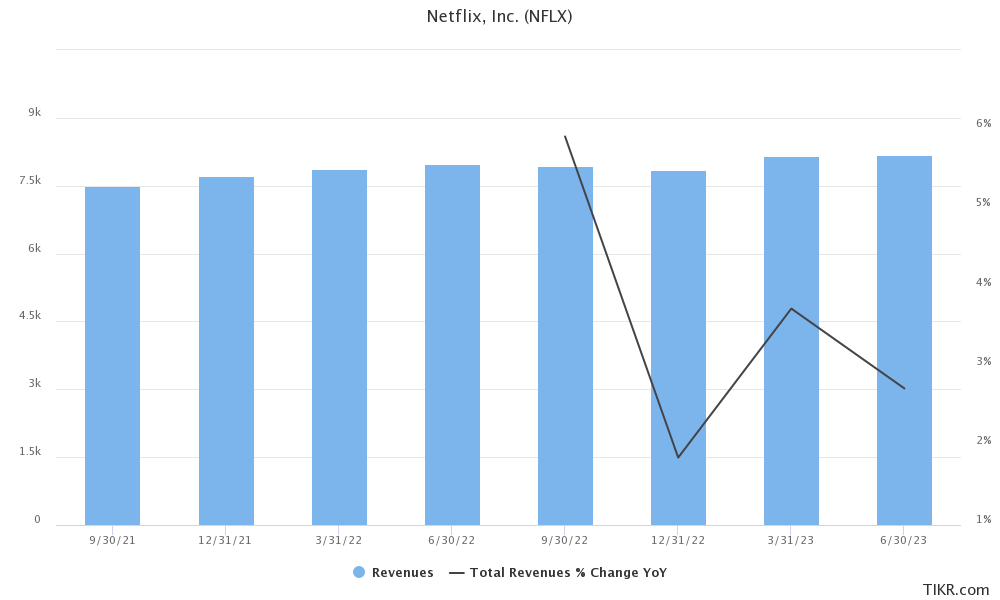Here’s How Analysts Reacted to Netflix’s Q2 Earnings
Please note that we are not authorised to provide any investment advice. The content on this page is for information purposes only.
Streaming giant Netflix (NYSE: NFLX) reported its Q2 earnings earlier this week. Here’s how analysts reacted to Netflix’s earnings and the key takeaways from the report.
Netflix reported revenues of $8.19 billion in the quarter which trailed analysts’ estimate of $8.30 billion. Its per-share earnings of $3.29 however came in ahead of the $2.86 that analysts were expecting.
The company added 5.9 million subscribers in the quarter. In the corresponding quarter last year, it lost almost 1 million subscribers.
In its shareholder letter, Netflix said, “While we’ve made steady progress this year, we have more work to do to reaccelerate our growth. We remain focused on: creating a steady drumbeat of must watch shows and movies; improving monetization; growing the enjoyment of our games; and investing to improve our service for members.”
Netflix’s stock fell after the earnings
Netflix stock fell sharply yesterday and is lower in early price action today also. Among others, markets were spooked by a lack of specific commentary on the ad-supported tier and password crackdown.
Netflix did not provide the number of subscribers for the ad-supported tier. It is however phasing out the Basic ad-free plan from the US and UK for new customers. The intent is to shift the customers to either the ad-supported tier or higher-priced plans.
According to Netflix, “While we continue to grow our reach—ads plan membership has nearly doubled since Q1— it’s still off a small membership base, so current ad revenue isn’t material for Netflix. Building an ads business from scratch isn’t easy and we have lots of hard work ahead, but we’re confident that over time we can develop advertising into a multi-billion dollar incremental revenue stream.”
NFLX expands password sharing crackdown
Last year, Netflix started cracking down on password sharing and said that according to its estimates, 100 million households watch its content through borrowed passwords. It launched paid password sharing last year and during the earnings call it said that it has now rolled out the service to over 100 markets which account for more than 80% of its revenues.
The company first tested the paid sharing feature in Latin America and said that some people canceled their subscriptions after the crackdown.
In its Q2 2023 shareholder letter, Netflix said, “The cancel reaction was low and while we’re still in the early stages of monetization, we’re seeing healthy conversion of borrower households into full paying Netflix memberships as well as the uptake of our extra member feature. We are revenue and paid membership positive vs. prior to the launch of paid sharing across every region in our latest launch.”
Netflix tempered expectations
Meanwhile, in response to an analyst question on the impact of password sharing crackdown, Netflix co-CEO Gregory Peters said “So it’s not an overnight kind of thing. Because, in part, the interventions are applied gradually and in part because some borrowers won’t immediately sign up for their own account, but we’ll do so next month or 3 months or 6 months or maybe even longer down the line, as we launch a title that they’re particularly interested in.”
Netflix’s cash flows to improve in 2023
Netflix now expects free cash flows of $5 billion in 2023 which is $1.5 billion higher than its previous forecast. Among others, it attributed higher cash flows to lower content spending due to the actors’ and writers’ strike while stressing “This strike is not an outcome that we wanted.”
The company forecast revenues of $8.5 billion for the third quarter which is 7% higher than the corresponding quarter last year. It has stopped providing guidance for streaming subscribers and said that revenue growth would be the apt metric for topline growth.
Rival Disney has also stopped chasing streaming subscriber growth and also withdrew its long-term streaming guidance under the new CEO Bob Iger.
Here’s how Wall Street reacted to Netflix’s earnings
Wall Street analysts mostly reacted positively to Netflix’s earnings. Paolo Pescatore, analyst at PP Foresight believes that the strong subscriber growth in the quarter was a “strong endorsement” of Netflix’s strategy.
He added, “The company is still in a far stronger position compared to rivals and remains the benchmark.”
Notably, while other streaming companies are struggling with losses, Netflix’s operations are profitable and it expects operating profit margins between 18%-20% in 2023.
Sophie Lund-Yates, lead equity analyst at Hargreaves Lansdown said, “Netflix needs to squeeze as much juice as it can from different avenues, given a recent lack of price increases could suggest that inflation is starting to bite Netflix’s ability to crank up its subscription price, as households look to trim their spending.”
She added, “Initial progress seems positive, but we are realms away from knowing for sure if this venture is the cash cow it’s been sold as.”
Bank of America raised Netflix’s target price
Bank of America reiterated Netflix’s target price from $490 to $525 and said, “Netflix (NFLX) reported healthy 2Q results, which reflected strong net adds of 5.9mn (vs. guidance of ~1.75mn and our 2.95mn est.), indicating the initial rollout of password sharing has been very positive.”
Wells Fargo analyst Steven Cahall attributed the fall in NFLX stock to high buy-side expectations. Notably, before the earnings call, Netflix stock had soared 60% in 2023 on high hopes from the ad-supported tier and password-sharing crackdown.
Pivotal Research Group analyst Jeffrey Wlodarczak also echoed similar views and attributed the post-earnings sell-off to profit-taking. Notably, Tesla stock also crashed after the Q2 earnings despite posting better-than-expected revenues and profits.
While Netflix and Tesla shares crashed following their respective earnings, Jim Cramer believes that they would eventually rebound.






